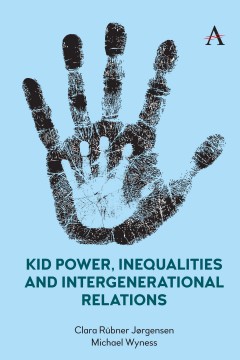Kid Power, Inequalities and Intergenerational Relations
By Clara Rübner Jørgensen & Michael Wyness
- About This Book
- Reviews
- Author Information
- Series
- Table of Contents
- Links
- Podcasts
About This Book
Contemporary understandings of inter-generational relations assume that the balance of power has shifted from adults towards children in recent years. The rise of children’s rights, the trend towards more child centred pedagogies and practices within schools and the incorporation of children within a global free market as consumers have all been interpreted as the loss of adult power and the consequent growth of kid power.
This book critically examines these ideas and reframes the zero-sum conceptions of power implicit within these assumptions. It draws on Lukes’ three dimensions of power and Foucault’s theory of power and knowledge in advancing the view that kid power is inter-generational, multi-dimensional and distributed variably across the child population. The book illustrates this theory through selected themes, including children’s political activism with respect to climate change, the varied roles that children play within their families as mediators, the involvement of children in research and the rise of digital kid power.
In a post-script, the theory of kid power within the current context of the global Covid-19 pandemic is examined. This final part of the book questions what the impact of the virus will be on the different manifestations of kid power and considers the implications of lockdowns and potential long-term social distancing measures for inequalities, inter-generational relations and our interpretation of kid power.
Reviews
‘This is an important, timely, and well-argued book which outlines a new, multidimensional, non-zero-sum model for understanding inequalities and power in children’s inter- and intra-generational relations.’ — Leena Alanen, Professor emerita (Early Childhood Education), Adjunct Professor/Docent (Sociology), University of Jyväskylä, Finland
‘An important and valuable contribution to thinking about children’s place in society, family and community.’ — Nigel Patrick Thomas, Professor Emeritus of Childhood and Youth, University of Central Lancashire, UK
‘This is an insightful, well-written, and timely book. It presents rich and stimulating contributions to research literature on childhood studies, namely to help researchers and practitioners to consider power relations with children in a critical and significant way. The book is most welcome and vastly recommended.’ —Natalia Fernandez, Professor, University of Minho, Portugal
‘The volume focuses on inequalities and generational relations. Both the topics are currently of particular interest in the field of childhood studies, but the authors adopt an innovative interpretive framework that is rarely used to interpret and explain intergenerational relations’. —Roberta Bosisio, Professor, University of Turin, Italy
Author Information
Clara Rübner Jørgensen is a social anthropologist specializing in the social and cultural contexts of childhood and education.
Michael Wyness is a sociologist with interests in childhood, schooling and family.
Series
Table of Contents
Acknowledgements; Introduction; Section 1: The ‘Problem’ of Kid Power; 1. Power and Children; 2. Global Rights and Kid Power; 3. Child- Centredness, Schooling and Kid Power; 4. The Loss of Adult Power?; Section 2: Reconstructing Kid Power; 5. Family, Generation and Mediation; 6. The Internet, Social Media and Kid Power; 7. Children’s Community Action; 8. The Power of Children’s Participation and Involvement in Research; Conclusion: A Model for Kid Power – Implications and Thinking Forward; Postscript: Covid-19; References; Index.
Links
Stay Updated
Information
Latest Tweets



